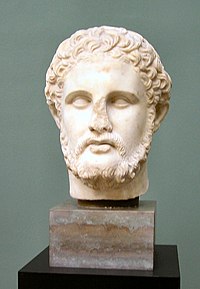Battle of Crocus Field
| Battle of Crocus Field | |||||||
|---|---|---|---|---|---|---|---|
| Part of the Third Sacred War and Rise of Macedon | |||||||
 Bust of Philip II of Macedon, whose army was victorious in the battle. |
|||||||
|
|||||||
| Belligerents | |||||||
|
Macedon, Thessalian Confederation |
Phocis, Athens |
||||||
| Commanders and leaders | |||||||
| Philip II of Macedon |
Onomarchos †, Chares |
||||||
The so-called Battle of Crocus Field (Krokion pedion) was a battle in the Third Sacred War, fought between the armies of Phocis, under Onomarchos, and the combined Thessalian and Macedonian army under Philip II of Macedon. In the bloodiest battle recorded in Ancient Greek history, the Phocians were decisively defeated by Philip's forces. Philip's victory secured his appointment as ruler of Thessaly, marking an important step in the rise of Macedon to political ascendancy in Ancient Greece. Opinion amongst historians is divided as to the year of the battle; some favour 353 BC, and others 352 BC.
The ancient sources for the Third Sacred War are scant, and generally lacking in firm chronological information. The main source for the period is Diodorus Siculus's Bibliotheca historica, written in the 1st century BC, which is therefore very much a secondary source. Diodorus is often derided by modern historians for his style and inaccuracies, but he preserves many details of the ancient period found nowhere else. Diodorus worked primarily by epitomizing the works of other historians, omitting many details where they did not suit his purpose, which was to illustrate moral lessons from history; his account of the Third Sacred War therefore contains many gaps.
Beyond Diodorus, further details of the Sacred War can be found in the orations of Athenian statesmen, primarily Demosthenes and Aeschines, which have survived intact. Since these speeches were never intended to be historical material, they must be treated with circumspection; Demosthenes and Aeschines have been described as "a couple of liars, neither of whom can be trusted to have told the truth in any matter in which it was remotely in his interest to lie". Nevertheless, their allusions to contemporary or past events indicates some of the gaps in Diodorus's account, and helps with the arrangement of the chronology. The accounts of Diodorus, Demosthenes and Aeschines can be further supplemented by fragments of otherwise lost histories (such as that by Theopompus) and by contemporary epigraphic sources.
...
Wikipedia
